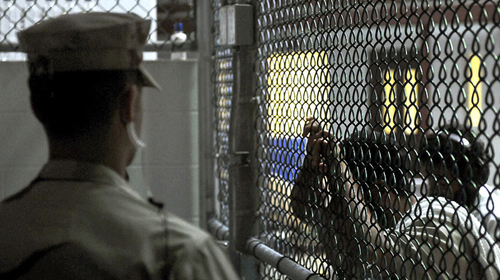
Government meddling has at the Guantánamo Bay military commissions, with the hearings of the last few days offering another crystal-clear example. The government's latest incursion into the commissions' proceedings further tarnishes the discredited military commissions system. It will also cost everyone more time and waste more taxpayer money.
I spent last week at Guantánamo, attending hearings related to the trial of Abd al Rahim Al-Nashiri for crimes related, among other things, to the bombing of the USS Cole in 2000. But the hearings didn't focus on the charges, or any other typical pre-trial issues. Instead the judge, Col. Vance Spath, spent the week's hearings exploring whether the Department of Defense had exerted "unlawful influence" over the case.
At issue was a successful recommendation made by the director and convening authority of the Office of Military Commissions, retired Maj. Gen. Vaughn Ary, for a new rule governing the Guantánamo Bay military commission judges. The rule, called "Change 1," would have forced the Guantánamo Bay commission judges to live at the base, working on no other matters until their commission cases are resolved. That's a big change. The judges presently travel down to the base only for hearings, residing elsewhere and working on other matters the rest of the time. They would be separated from their families and forced to relinquish their other cases under the new rule.
Last week, Ary testified about Change 1. He acknowledged that he thought the commissions were moving too slowly, but he denied that the new rule was designed to entice judges to accelerate proceedings in exchange for an earlier return home.
While Ary only testified in the Al-Nashiri case, Change 1 also came up last week in another case at Guantánamo Bay. The judge in the case against Khalid Sheikh Mohammed and other 9/11 defendants, Col. James Pohl, Wednesday that the government did indeed attempt to influence the commissions unlawfully by implementing its new rule. Judge Pohl halted proceedings in the 9/11 defendants' case until the government revoked the new rule.
Friday morning, the Department of Defense abruptly rescinded Change 1. That appears to put the 9/11 case back on track. In the Al-Nashiri case, however, Judge Spath today that Ary's actions could undermine public confidence in the fairness of the proceedings. He that Ary and his staff be prohibited from future involvement in the case. The Pentagon to manage the Al-Nashiri trial, and in the meantime, Judge Spath has cut back on scheduled hearings, in part , and in part that the pace of litigation in this case remains .
The irony of the situation is notable: The government's attempt to speed up the commissions instead derailed them. Even if Change 1 were lawful, it failed spectacularly in achieving its apparent objective, temporarily freezing the 9/11 defendants' case and eating up a week's worth of hearing time in Al-Nashiri's before triggering the postponement of future hearings.
More importantly, we have yet another indication that these trials should take place in traditional federal courts rather than military commissions. Many federal judges hold their positions for life and can only be removed in extreme situations. They are primarily accountable to other independent judges above them rather than executive branch employees like Ary. Their independence is baked into the system, insulating them from the sort of pressure the government appears to be exerting at Guantánamo.
This is that unlawful influence by the government has come up in the military commissions, so these recent developments are not surprising, even if they are dramatic. They are the predictable outgrowth of an ad hoc system of justice that is inherently vulnerable to interference. Indeed, Ary argued that the military commissions are distinctively designed to permit the Department of Defense to modify the scope of judicial duties unilaterally.
Federal courts are not perfect, but ÔÇô unlike the commissions ÔÇô at least their fundamental credibility is intact.
Learn more about military commissions and other civil liberty issues: Sign up for breaking news alerts, , and .

